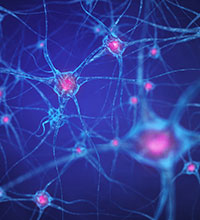- Heroin and the brain
- Depression
- Post Traumatic Stress Disorder (PTSD)
- Anxiety Disorder and Heroin Abuse
- Mental health consequences of HIV
- Sources
What is Heroin?
Heroin is a synthetic opioid derived from the naturally occurring opioid morphine.
- It has a high abuse liability due to its rapid onset of action and euphoric effects.
- Heroin use is also correlated with a host of mental health conditions and the risk of contracting viral diseases as a result of irresponsible, non-sterile drug use.
Tolerance to the effects of heroin occurs very quickly, such that a higher dose is required to achieve the same high. Due to the nature of this escalation, there is an increase in the risk of overdose and death.
- Data published by the National Institute of Drug Abuse (NIDA) indicates that there are an estimated 467,000 people addicted to heroin as of 2012.
- Of these 467,000 people, it is estimated that over 8,000 will die due to their heroin use.
Heroin and the brain
Heroin interacts with the 'pain perception' mechanisms of the human body. Heroin is an illicit opioid drug that is converted into morphine once it enters the brain, then binds to opioid receptors in the brain, brain stem, and the body.
Morphine imitates the actions of endogenous opioids, which are produced naturally in the body, and causes analgesia (pain relief).
This opioid inhibits gamma-aminobutyric acid (GABA), a neurotransmitter that decreases dopamine presence in the brain.
If GABA levels are reduced, then dopamine is released and the user feels euphoria and pleasure.
Dopamine is a neurotransmitter commonly associated with the reward pathway in the brain and is responsible for the reinforcing properties of heroin use and subsequent addiction.
Long-term heroin use has profound negative effects on the brain and behavior.

The white matter of the brain has been found to deteriorate over time with continuous heroin use, which affects the individual’s ability to respond to stressful stimuli, manage behavior, and make decisions. Such structural and functional changes could cause the person suffering from a heroin addiction to be vulnerable to developing a mental health condition.
An important point to note about the pain perception mechanisms of heroin is that it does not distinguish between physical and emotional pain.
- Meaning that a person will experience emotional pain in the same way.
- MRI studies examining this issue have revealed that pain-related centers of the brain show increased activity when a person is experiencing negative emotional arousal.
Tolerance to the effects of heroin occurs very quickly, such that a higher dose is required to achieve the same high. Due to the nature of this escalation, there is an increase in the risk of overdose and death. If you are suffering from heroin addiction and have a concurrent mental health problem, do not wait. Please call
1-888-993-3112Who Answers? to connect with a comprehensive treatment program today.
Depression
Heroin is a highly addictive and life-threatening opioid drug that decreases pain, induces euphoria and warmth, and causes drowsiness.
- According to the Diagnostic and Statistical Manual of Mental Disorders, Fifth Edition (DSM-5), those who are addicted to opioids have an increased risk of developing persistent depressive disorder and in some instances, major depressive disorder.
- It is estimated that nearly half of all opioid addicts have experienced depression at some point in their lives.
- Furthermore, those suffering from a heroin addiction are 14 times more likely to commit suicide than their non-addicted peers.
Depression may be a pre-existing mental health disorder, related to psychosocial stressors associated with heroin addiction, or caused by heroin
withdrawal.
Medical maintenance with either methadone or buprenorphine is common in treating those addicted to heroin.
- Research has proven the efficacy of these opioid dependence medications in also improving depressive symptoms in heroin-addicted individuals.
- Research has also revealed that once the individuals suffering from an opioid addiction contacted an addiction treatment program, their moods improved significantly.
Post Traumatic Stress Disorder (PTSD)
PTSD may also be comorbid with heroin abuse. While one may not be causative of the other, their association may be due to a number of shared factors (including those of a psychological, genetic or environmental nature) that may increase the susceptibility to both conditions.
Psychological factors again arise in pain and avoidance.
 With integrated therapy, both the heroin abuse or addiction and mental health condition can be treated. Don't delay your recovery.
With integrated therapy, both the heroin abuse or addiction and mental health condition can be treated. Don't delay your recovery.
- In anxiety and PTSD, experiential avoidance and anxiety sensitivity has been linked to severity of symptomology.
- The ability to increase pleasure pathways through heroin abuse allows for avoidance of pain triggers creating an incentive to use heroin and therefore, providing an explanation of how substance abuse disorders can arise in individuals with PTSD.
- Research seems to support the link between PTSD and heroin abuse—in some cases, the severity of heroin abuse is directly proportional to the severity of PTSD symptoms.
While no pharmacological treatment has been established specifically for the treatment of PTSD, there is some indication that a lack of adherence to heroin maintenance treatments, like methadone, are correlated with an increase in severity of PTSD symptoms.
- This correlation suggests that PTSD and heroin abuse are inextricably linked and improvement in the heroin addiction domain will inevitably have effects on the reduction of PTSD.
Anxiety Disorder and Heroin Abuse
The relationship between anxiety disorders and opiate dependence is complicated because:
- Anxiety and/or anxiety disorders may be a consequence of the addiction due to the effects of using, abstinence (withdrawal development) and effects of the using environment.
- However, the high comorbidity suggests that underlying anxiety may result in the actual dependence, i.e., anxiety came first and the self-medication hypothesis applies.
Because of the complex nature of this comorbidity, some recommendations have been made to accurately diagnose and manage both opiate dependence and anxiety disorders. These include:
- Patients presenting with opiate dependence should be screened for anxiety problems and vice versa, because early identification has important treatment implications.
- Integrated treatment has been emphatically recommended, such that treating a comorbid anxiety disorder must complement the pharmacological interventions for treating opiate dependence.
- Evidence-based recommendations for treating anxiety disorders involve a combination of antidepressant therapy and cognitive-behavioral treatment.
- The use of benzodiazepines should be avoided in this population due to the increased risk of developing abuse or dependence, as comorbid benzodiazepine abuse in opiate dependent patients seems to be significant.
Epidemiological data indicate that having a substance use disorder increases the risk of being diagnosed with an anxiety disorder by almost 2.5 times. If you have been suffering from symptoms of anxiety in conjunction with substance abuse, do not feel ashamed or alone. Comprehensive treatment can help you recover from both;
please call
1-888-993-3112Who Answers? to find a program that's right for you.
Mental health consequences of HIV
Heroin abuse by intravenous administration may lead to blood-borne disease such as the human immunodeficiency virus (HRV). This is due to the risks involved in sharing needles and/or irresponsible needle use habits that impair the sterility of syringes. In a four-year study of patients at a treatment facility for addiction, 61% had contracted HIV.
Other factors that contribute to this correlation are:
- Mental illness: This is due to the link between poor impulse control and risk taking behaviors.
- History of abuse (physical, sexual and emotional): This is due to this population being more likely to abuse substances and practice risk-taking behaviors.

A challenge with HIV positive individuals that have comorbid substance abuse problems, such as heroin, is treatment initiation. There is a reduced likelihood of asking for, or accessing treatment, due to the stigma associated with substance abuse.
In summary, treatment recommendations with comorbid substance use and mental health disorders are based on the principle of
dual diagnosis. Treatment plans include:
- Medication to address physical and emotional dependence and psychotherapy methods such as Cognitive Behavioral Therapy (CBT).
- The management of other complications like treatment initiation and adherence in HIV-positive heroin users is also paramount to treating a comorbid condition.
Call
1-888-993-3112Who Answers? to learn about inpatient recovery programs. Be sure to ask whether they are qualified to treat dually-diagnosed heroin and mental health conditions.
You can also use the Substance Abuse and Mental Health Services Administration (SAMHSA) treatment finding tool to look for inpatient and outpatient programs near you.
Sources
1. Gudin JA, Mogali S, Jones JD, Comer SD. Risks, Management, and Monitoring of Combination Opioid, Benzodiazepines, and/or Alcohol Use. Postgraduate medicine. 2013;125(4):115-130.
2. Vadivelu N, Mitra S, Kaye AD, Urman RD. Perioperative analgesia and challenges in the drug-addicted and drug-dependent patient. Best practice & research. Clinical anaesthesiology. 2014;28(1):91-101.
3. Saffier K, Colombo C, Brown D, Mundt MP, Fleming MF. Addiction Severity Index in a chronic pain sample receiving opioid therapy. Journal of substance abuse treatment. 2007;33(3):303-311.
4. Sun Y, Wang GB, Lin QX, et al. Disrupted white matter structural connectivity in heroin abusers. Addiction biology. 2015.
5. Brady KT, McCauley JL, Back SE. Prescription Opioid Misuse, Abuse, and Treatment in the United States: An Update. The American journal of psychiatry. 2015:appiajp201515020262.
6. Zaaijer ER, van Dijk L, de Bruin K, et al. Effect of extended-release naltrexone on striatal dopamine transporter availability, depression and anhedonia in heroin-dependent patients. Psychopharmacology. 2015;232(14):2597-2607.
7. Dell'Osso L, Rugani F, Maremmani AG, Bertoni S, Pani PP, Maremmani I. Towards a unitary perspective between post-traumatic stress disorder and substance use disorder. Heroin use disorder as case study. Comprehensive psychiatry. 2014;55(5):1244-1251.
8. Schmidt A, Borgwardt S, Gerber H, et al. Acute effects of heroin on negative emotional processing: relation of amygdala activity and stress-related responses. Biological psychiatry. 2014;76(4):289-296.
9. Pani PP, Trogu E, Vigna-Taglianti F, et al. Psychopathological symptoms of patients with heroin addiction entering opioid agonist or therapeutic community treatment. Annals of general psychiatry. 2014;13(1):35.
10. Drug facts Sheet Heroin, 2014 NIH/NIDA. Accessed 11/2015
11. Cosgrove KP et al. Dopamine and serotonin transporter availability in chronic heroin users: a [123I]β-CIT SPECT imaging study. Psychiatry Res. 2010; 184(3): 192–195.
12. Laslocky M. This is your brain on Heartbreak. Greater Good. 2013;Feb 15th.
13. Pain is at the Heart of Heroin Addiction. The Meadows Blog. 2015;July 13th
14. Khantzian EJ. The self-medication hypothesis of addictive disorders: focus on heroin and cocaine dependence. Am J Psychiatry. 1985;142(11):1259-64.
15. Weiss RD et al. Drug Abuse as Self-Medication for Depression: An Empirical Study. The American Journal of Drug and Alcohol Abuse: Encompassing All Addictive Disorders 1992; 18(2):121-29.
16. Bardeen JR. Short-term pain for long-term gain: the role of experiential avoidance in the relation between anxiety sensitivity and emotional distress. J Anxiety Disord. 2015 Mar;30:113-9.
17. PTSD: National Center for PTSD. http://www.ptsd.va.gov/. Accessed 11/2015
18. HIV and Substance Use in the United States. CDC. http://www.cdc.gov/hiv/risk/substanceuese.html Accessed 11/2015
19. http://www.drugabuse.gov/about-nida/legislative-activities/testimony-to-congress/2015/americas-addiction-to-opioids-heroin-prescription-drug-abuse. Accessed 11/2015
20. Nunes, E., Sullivan, M., & Levin, F. (2004). Treatment of depression in patients with opiate dependence. Biological Psychiatry, 56(10), 793-802. doi:10.1016/j.biopsych.2004.06.037.
21. Mcintosh, C. (2001). Treating depression complicated by substance misuse. Advances in Psychiatric Treatment, 7(5), 357-364. doi:10.1192/apt.7.5.357
22. Darke, S., & Ross, J. (2002). Suicide among heroin users: Rates, risk factors and methods. Addiction, 97(11), 1383-1394. doi:10.1046/j.1360-0443.2002.00214.x.
23. What are the long-term effects of heroin use? (2014, November 1). Retrieved December 8, 2015, from http://www.drugabuse.gov/publications/research-reports/heroin/what-are-long-term-effects-heroin-use
24. Zovko, A., & Criscuolo, C. (2009). The Pharmacological Effects of Diacetylmorphine (Heroin) After Diffusion Through the Blood-Brain Barrier. Retrieved December 8, 2015, from The Pharmacological Effects of Diacetylmorphine (Heroin) After Diffusion Through the Blood-Brain Barrier.
25. Substance Abuse and Mental Health Services Administration, Results from the 2012 National Survey on Drug Use and Health: Summary of National Findings, NSDUH Series H-46, HHS Publication No. (SMA) 13-4795. Rockville, MD: Substance Abuse and Mental Health Services Administration, 2013.


